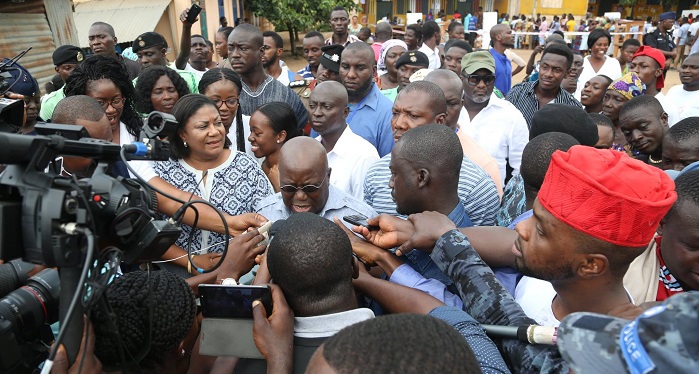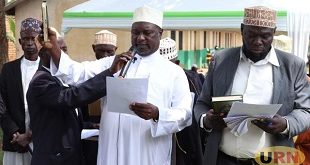
Accra, Ghana | AFP |
Opposition challenger Nana Akufo-Addo has a clear lead in Ghana’s hotly contested presidential election, local media reported Friday, although official results have yet to be released two days after the vote.
And supporters of incumbent President John Mahama insisted he had emerged triumphant again, despite acknowledging losses in the parliamentary contest.
Joy News television gave Akufo-Addo just under 54 percent of votes counted in 251 out of 275 constituencies in an election seen as a test of stability in Africa’s most secure democracy.
Crowds of jubilant supporters were partying at the home of the 72-year-old New Patriotic Party (NPP) leader, who had already claimed victory on Thursday, a day after the vote.
Dozens of NPP activists dressed entirely in white took to the streets to celebrate Akufo-Addo’s arrival, waving red, white and blue party flags.
Mahama, who Joy News said had gained 44.5 percent of the vote, pledged to respect the results, as his supporters voiced confidence they had won.
“I want to assure the nation that we will respect the outcome of the elections, positive or negative,” the charismatic 58-year-old said at his Accra residence.
He called for calm and patience over the slow pace of the count.
“Let’s allow the EC (electoral commission) to carry out its constitutional mandate. We’ll make Ghana proud no matter (the) outcome,” he said on Twitter.
Ghana’s election agency had said it would need at least 72 hours after polls closed before it would be able to publish the final official results.
‘Disappointing’ turnout
Election commission head Charlotte Osei told reporters that turnout was around 49 percent.
“This is way below our history in elections so far and it’s quite disappointing,” she said.
However independent observers from the US-based National Democratic Institute (NDI) said 69 percent of the electorate had cast ballots.
Akufo-Addo had told a cheering crowd at his home on Thursday that he was “confident” he had won, drawing the condemnation of independent observers who said it was too early to call the election.
George Lawson, deputy general secretary of Mahama’s National Democratic Congress (NDC) party also dismissed Akufo-Addo’s claim.
“We are sure the president will carry the day,” he told AFP, while conceding the NDC had lost ground in parliament.
The election was “very peaceful and very transparent, our democracy is growing”.
‘Generally credible’
If neither leading candidate wins more than 50 percent of votes there will be a run-off in December.
The winner will serve a four-year term in the former British colony, a once booming country that has seen its economy slow, currency deteriorate and inflation soar.
Tensions were palpable after the election was tainted by sporadic violence in a country once hailed by US President Barack Obama for its peaceful transitions of power.
Independent observers said that the “polling and counting processes were generally credible”.
Mahama, who came to power in 2012 after beating Akufo-Addo, has urged voters to “stay the course”, promising to deliver more infrastructure projects.
Akufo-Addo is making his third bid for the top job.
His NPP has blasted Ghana’s poor economic growth rate — estimated at 3.3 percent in 2016, the lowest rate for two decades — and laid out a radical vision to transform the country’s economy.
Ghana is the world’s second biggest producer of cocoa after Ivory Coast and Africa’s second biggest gold producer after South Africa.
But it was forced to turn to the International Monetary Fund (IMF) in 2015 for a bailout as global commodity prices tanked.
Ghana’s elections have been historically close, with Mahama narrowly winning in 2012 with 50.7 percent. Akufo-Addo unsuccessfully challenged Mahama’s victory in the courts.
Manji Cheto, senior vice president at Teneo Intelligence analysts, said Ghanaians appeared to have used the polls as a protest vote.
“These elections have demonstrated yet again that Ghanaians believe the polls to be the most effective way to send a clear message to their leaders about their displeasure,” she said.
 The Independent Uganda: You get the Truth we Pay the Price
The Independent Uganda: You get the Truth we Pay the Price



